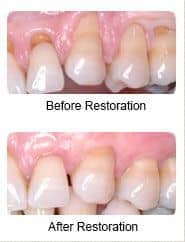
Periodontal Dentistry
Periodontics is a dental specialty that deals in the treatment of the gum tissue supporting the teeth.
Periodontal disease or gum disease is an infection of bone and the supporting structures of your teeth. It is estimated that 80%5 of the adult population has gum disease to one degree or another.
Periodontal bacteria can cause an inflammatory reaction which leads to the destruction of the fibers that connect teeth to bone and can create a space called a periodontal pocket. While everyone has some amount of pocketing, the normal depths are 1 to 3 mm. You can keep 3 mm or less pockets clean by yourself with routine brushing and flossing. However, in situations of periodontal disease, the pockets are deeper than 3 mm and it is impossible for you to clean and maintain them. As a result, bacteria and debris exist at the bottom of the pocket which leads to chronic gum infection. As we age, we become more susceptible to periodontal bacteria and lack of proper hygiene or cleaning is another reason for periodontal disease. Without treatment, teeth will lose enough support to become loose and painful and eventually will be lost.
I am concerned about my gums: How serious can periodontal disease get?
Gum disease not only affects the gums and inside your mouth, but also affects your entire body! If you have gum disease you are also running the risk of many other much worse problems such as: stroke, heart disease, lung disease, diabetes, gastric ulcers, osteoporosis and preterm babies.
The only way to prevent problems like these from occurring is to care for your gums.
What are the stages of periodontal disease?
Gingivitis
Gingivitis is an early stage of gum disease. Gums become tender, swollen and likely to bleed. This generally can be stopped with proper oral hygiene and treatment from your dentist.
Moderate Periodontitis
At the moderate stage of gum disease, the gums deteriorate and begin detaching themselves from the teeth forming gum pockets, which allows plaque to collect below the gum line. This causes tooth roots to become susceptible to decay.
Advanced Periodontitis
This is an advanced stage of gum tissue and bone loss. Teeth become loose and may even need to be extracted. This causes difficulties in normal everyday chewing and biting. If advanced periodontal disease is left untreated, patients run the risk of other serious health problems.
What are the treatments for gum disease?
Tooth Scaling
Scaling is necessary when plaque and tartar are detected at or below the gum line. Plaque and tartar are then scraped off the tooth's crown and root.
Root Planing
In many cases, the tooth's surface is smoothed by root planing after scaling.
Medication
Antibiotics or irrigation with antimicrobials (chemical agents or mouth rinses)may also be required to help control the growth of bacteria that create toxins and cause periodontitis.
Tissue Graft
Often gum tissues around the necks of the teeth recede due to periodontal disease, genetically thin tissue, or aggressive oral hygiene. As a result of recession, tooth roots often become sensitive to cold. We can perform a variety of periodontal tissue augmentation procedures which can cover sensitive or unaesthetic root exposures. In addition to improving aesthetics, tissue grafting procedures provide a thicker band of tissue around the necks of treated teeth which improves long-term prognosis.
My gums are healthy but my teeth are too short
Your teeth may actually be the proper lengths, but they are covered with too much gum tissue. Gingivectomy is a procedure to correct this condition.
During this procedure, excess gum and bone tissue are re-shaped to expose more of the natural tooth. This can be done to one tooth, to even your gum line, or to several teeth to expose a natural, broad smile.
Alloderm grafting
Specialists can perform periodontal plastic surgical procedures to replace missing gum tissue with grafting procedures. In the past this procedure required that a piece of tissue be harvested from the roof of the mouth to serve as graft material. Unfortunately, not everyone has enough tissue available or wants to have tissue taken from this sensitive area. Dr. Binder's periodontist uses a product called Alloderm for his grafting. Alloderm is a safe and effective product widely used in medicine and dentistry. Alloderm provides the missing components needed to restore health to damaged or receding tissue. It leads to fast healing and delivers great cosmetic results.
Dr. Binder will provide you with more information and help you decide if oral plastic surgery is the most appropriate method to achieve your goals.